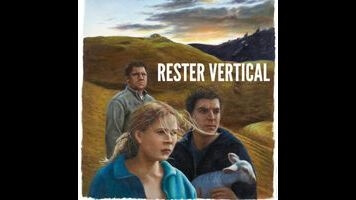Suction cups, prog rock, wolves: Staying Vertical’s beguiling oddities keep coming

Opening a movie by fading in, rather than simply throwing the first shot onto the screen without prelude, is now so uncommon as to seem distinctly old-fashioned. It’s stranger still to fade in on a shot that appears to be already in progress, as Staying Vertical does. There’s no reason why writer-director Alain Guiraudie—the French iconoclast who previously made Stranger By The Lake, among others—couldn’t have kicked off his latest film the usual way, with a shot of the camera traveling down a winding one-lane country road. (Sound design makes it clear that the perspective is from within a car, though no windshield is visible.) But just as a song’s gradual fadeout implies that it’ll go on forever, unheard, this shot’s slow fade in suggests a journey without a beginning. That feeling of eternal and perpetual motion is ideal for Staying Vertical, whose rootless protagonist cycles (figuratively speaking; he drives a Renault) among several key locations, over and over again, forever in search of an undefined goal that seems maddeningly elusive.
Technically, Léo (Damien Bonnard), who looks to be in his late 30s, is working on a screenplay—throughout the film, he keeps calling his producer to assure him that the script is nearly finished (and to beg for another advance). Léo never writes a word, though. Instead, he just drives around, occasionally stopping to talk to a stranger who catches his eye. One of these encounters, with a shepherd’s daughter named Marie (India Hair), almost instantly results in the birth of their child, with whom Léo gets stuck when Marie, frustrated, takes her other two kids (from another father) and leaves town. Even before that happens, though, Léo keeps being repeatedly drawn back to a) Yoan (Basile Meilleurat), a hunky young man who lives with the much older, extremely crotchety Jean-Louis (Raphaël Thierry); b) a homeless man (Tangi Belbeoc’h) who sleeps beneath an overpass in the middle of an affluent neighborhood; and c) a doctor (Laure Calamy) who practices outdoors, in a remote location accessible only by rowboat, conducting bizarre tests that involve attaching vines with little suction cups to the patient’s face and torso.
This last detail, which Staying Vertical presents with an utterly straight face, may confound viewers who’ve only seen the comparatively naturalistic Stranger By The Lake. Guiraudie has a penchant for offhand surrealism, however (it dominates his 2003 film No Rest For The Brave), which helps to underline the sense of things being slightly askew. Likewise, Léo’s casually fluid sexuality—he’s equally attracted to Yoan and Marie, and perfectly willing to have sex with the elderly Jean-Louis (in a startling, unforgettable sequence that combines prog rock, a mercy fuck, and assisted suicide)—is very much in keeping with previous Guiraudie films like King Of Escape (2009). This film, too, could have been called King Of Escape, actually, as Léo keeps bolting from one of his haunts to revisit another, in what amounts to an enormous circle encompassing the urban, the suburban, and the rural. As is often in the case in Guiraudie’s films, unspoken societal norms, from which the hero unsuccessfully struggles to flee, serve as the antagonist.
But that sounds deadly serious, whereas Staying Vertical is distinguished largely by its poker-faced playfulness. Bonnard is a wonderfully quizzical presence in the lead, expertly creating the impression of a person who has no idea what he wants but is nonetheless determined to get it. (Léo’s failure to write the screenplay for which he’s being handsomely paid culminates in the movie’s best joke, when his fed-up producer finally tracks him down at the least likely place and time.) Various oddball moments—Léo being engulfed and stripped naked by a horde of homeless men; Marie’s father (Christian Bouillette) using his infant grandchild as live bait for wolves—walk a gratifying line between funny and disturbing. Léo’s mixed feeling of fear and fascination toward wolves speaks to the war waged within him between freedom and responsibility; the film’s title has a double meaning, referring both to sexuality (which is often horizontal) and to human beings separating ourselves from the rest of the animal kingdom by standing upright. The ending is deliberately, thrillingly unresolved, to the point where it seems to demand a slow fade-out. There isn’t one.